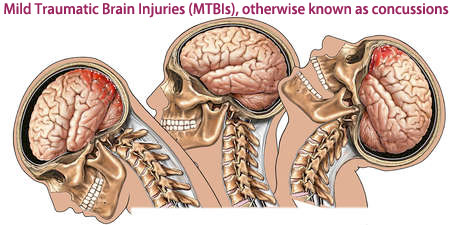Concussion, The Hidden Injury
 Concussion, also known as mlid traumatic brain injury (mTBI), is very difficult for an athlete to accept as an injury worthy of rehabilitation. Like any other injury, recovery and return to play needs to gradual and systematic. However, since a concussion is not as “visible” as a broken leg requiring a cast, many athletes have difficulty accepting the cognitive (memory, concentration), emotional (depression, anxiety, irritability), and physical (headache, fatigue, blurred vision) symptoms that accompany the injury. Often, this leads the athlete to rush through the rehabilitative process in order to return to play. Unfortunately, this exacerbates the process of recovery and might lead to re-injury.
Concussion, also known as mlid traumatic brain injury (mTBI), is very difficult for an athlete to accept as an injury worthy of rehabilitation. Like any other injury, recovery and return to play needs to gradual and systematic. However, since a concussion is not as “visible” as a broken leg requiring a cast, many athletes have difficulty accepting the cognitive (memory, concentration), emotional (depression, anxiety, irritability), and physical (headache, fatigue, blurred vision) symptoms that accompany the injury. Often, this leads the athlete to rush through the rehabilitative process in order to return to play. Unfortunately, this exacerbates the process of recovery and might lead to re-injury.
A psychologist with training in sport psychology can increase coping mechanisms, assist in taking small behavioral steps to return to play, provide a structured approach to manage daily activities such as school/work and driving.
At New Jersey Clinical and Sport Psychology in Ridgewood, NJ, John E. Macri, Ph.D., CC-AASP has worked with athletes and professionals who have suffered from concussion and post-concussion syndrome.
Words of Advice
1) Treat it as you would any other injury by practicing self-care (sleeping and eating at regular intervals, etc.)
2) If you have any feelings of depression, anxiety, or panic for a length of time, seek professional help.
3) Adjust your school/work schedule for work completion in a manner that is slow and steady.
4) Take smaller and systematic steps in your return to play.
5) If this not your first concussion, be even more cautious and mindful of these words of advice.
If you need assistance in recovery from this injury, please do not hesitate to call him at (201)-445-3306 or john@newjerseycsp.com